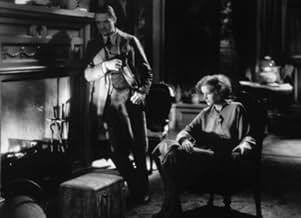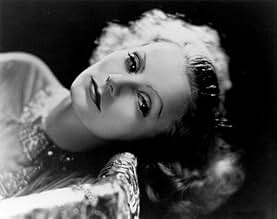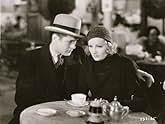Adicionar um enredo no seu idiomaYvonne is a beautiful model who loves frequenting the Parisian bohemian life, because she loves hobnobbing with artists.Yvonne is a beautiful model who loves frequenting the Parisian bohemian life, because she loves hobnobbing with artists.Yvonne is a beautiful model who loves frequenting the Parisian bohemian life, because she loves hobnobbing with artists.
- Direção
- Roteiristas
- Artistas
- Prêmios
- 1 vitória no total
Clara Blandick
- Madeleine's Mother
- (não creditado)
Sidney Bracey
- Waiter with Coffee and Cream Pitchers
- (não creditado)
- Direção
- Roteiristas
- Elenco e equipe completos
- Produção, bilheteria e muito mais no IMDbPro
Avaliações em destaque
Inspiration (1931)
** 1/2 (out of 4)
A beautiful model (Greta Garbo) begins dating a good, shy guy (Robert Montgomery) but things hit hard times when he learns of her rather sluttish past. Once again Garbo is quite good and Montgomery is strong but the story lets both of them down. Things start off quite nice and move well but at the 45-minute mark things just fall apart because the story keeps repeating itself. He forgives her, learns something else, hates her, forgives her, learns something else and hates her again. A nice ending almost saves the film but not quite.
Romance (1930)
** (out of 4)
An Italian opera diva (Greta Garbo) with a troubled past falls in love with a priest (Gavin Gordon). Like many early sound films this one here talks and talks and talks but sadly most of the talk isn't very interesting. Garbo is very good in her role, although it's a bit hard to believe her as an opera star. Gordon on the other hand is fairly weak and it's a shame Garbo couldn't get Gary Cooper like she wanted. The ending is so incredibly bad you can't help but laughs but hey, there's Garbo.
** 1/2 (out of 4)
A beautiful model (Greta Garbo) begins dating a good, shy guy (Robert Montgomery) but things hit hard times when he learns of her rather sluttish past. Once again Garbo is quite good and Montgomery is strong but the story lets both of them down. Things start off quite nice and move well but at the 45-minute mark things just fall apart because the story keeps repeating itself. He forgives her, learns something else, hates her, forgives her, learns something else and hates her again. A nice ending almost saves the film but not quite.
Romance (1930)
** (out of 4)
An Italian opera diva (Greta Garbo) with a troubled past falls in love with a priest (Gavin Gordon). Like many early sound films this one here talks and talks and talks but sadly most of the talk isn't very interesting. Garbo is very good in her role, although it's a bit hard to believe her as an opera star. Gordon on the other hand is fairly weak and it's a shame Garbo couldn't get Gary Cooper like she wanted. The ending is so incredibly bad you can't help but laughs but hey, there's Garbo.
Cocktail circuit coquette trades in her lavish lifestyle for the sake of a more genuine attachment, the pursuit of which only seems to involve compromise, disappointment and despair. It's a philosophical little film suffused with romantic melancholy.
There are more famous films where Garbo says she wants to be alone, and where she laughs, but she does both here too. There's little in the way of action but it has a pleasing lilt as it shifts from high glamour to an almost expressionist gloom.
Two fine contrasting scenes - a sunny breakfast in the park and a snowy night - capture the mood of the transition between hope and resignation - and we get to see Garbo go from some of Adrian's most impressive creations to a dishevelled dressing gown.
Was saving this for a sleepless night and it went down a treat in the small hours when it was just me and the night and Garbo.
There are more famous films where Garbo says she wants to be alone, and where she laughs, but she does both here too. There's little in the way of action but it has a pleasing lilt as it shifts from high glamour to an almost expressionist gloom.
Two fine contrasting scenes - a sunny breakfast in the park and a snowy night - capture the mood of the transition between hope and resignation - and we get to see Garbo go from some of Adrian's most impressive creations to a dishevelled dressing gown.
Was saving this for a sleepless night and it went down a treat in the small hours when it was just me and the night and Garbo.
"Isn't life always full of romance?" (the personal quote by Greta Garbo)
The Garbo's words I entailed at the beginning of my review do not only refer to an individual life that they were meant to but, more importantly, appear to resemble most of Garbo's career in Hollywood. Aren't most of her films full of romance? And that is perfectly all right when we consider this movie made at the dawn of talkies, along with ANNA Christie and ROMANCE by Clarence Brown, Garbo's beloved director. Again, INSPIRATION appears to discuss the similar theme of self sacrifice, honest feelings changing people from within, significant decisions that require courage and that lead to love that inspires and illumines life. What a classical, timeless theme of old cinema!
And...who makes INSPIRATION worth seeing is, of course, Garbo whose gracious presence in movies will always live in the hearts of her fans and classic movie buffs worldwide. Again, as it is the case with most movies she made in MGM between 1925 and 1941, her exceptional acting and glamorous photography by William Daniels leave a lasting impact on the viewer's memory. Moreover, among the supporting cast, we can admire Lewis Stone, the wonderful actor whose memorable performances I have mentioned in many of my reviews on Garbo films. Here, he is equally convincing.
And everything would seem to make way for INSPIRATION to be successful, to be inspiring for both the viewers of the 1930s and for today's classic buffs. Yet, INSPIRATION is usually mentioned as one of Garbo's least significant films. Why?
The reason for that lies in the leading man, Robert Montgomery. His role of Andre, a 24 year-old man in love with delicious Yvonne is an interesting role that could be depicted with desirable passion and memorable chemistry. Surely, that would have been not so hard for Garbo's ultimate leading man, John Gilbert, as well as for Melvyn Douglas (who played at her side in NINOTCHKA, for instance), for John Barrymore (in GRAND HOTEL), Robert Taylor (in CAMILLE) and Ramon Novarro (in MATA HARI). But it was beyond Robert Montgomery's skills and attempts. It is worse than ever with absolutely no chemistry between Garbo and Montgomery. One can say while looking at them that he is the worst leading man for Garbo, which, above all, makes their love in the plot hardly convincing. There are moments when Garbo intuitively tries to create a natural, authentic situation (because she was known to create things in acting situations galore) and Montgomery maintains fake and pathetic. Consider, for instance, their scenes on stairs that could have been so well executed.
Therefore, I think that INSPIRATION is, in no way, one of Garbo's first films that you should plan to see. It's worth for Garbo fans who know her great top movies of the 1920s and 1930s and want to see the queen of MGM in yet another role. No top movie whatsoever! 5/10
The Garbo's words I entailed at the beginning of my review do not only refer to an individual life that they were meant to but, more importantly, appear to resemble most of Garbo's career in Hollywood. Aren't most of her films full of romance? And that is perfectly all right when we consider this movie made at the dawn of talkies, along with ANNA Christie and ROMANCE by Clarence Brown, Garbo's beloved director. Again, INSPIRATION appears to discuss the similar theme of self sacrifice, honest feelings changing people from within, significant decisions that require courage and that lead to love that inspires and illumines life. What a classical, timeless theme of old cinema!
And...who makes INSPIRATION worth seeing is, of course, Garbo whose gracious presence in movies will always live in the hearts of her fans and classic movie buffs worldwide. Again, as it is the case with most movies she made in MGM between 1925 and 1941, her exceptional acting and glamorous photography by William Daniels leave a lasting impact on the viewer's memory. Moreover, among the supporting cast, we can admire Lewis Stone, the wonderful actor whose memorable performances I have mentioned in many of my reviews on Garbo films. Here, he is equally convincing.
And everything would seem to make way for INSPIRATION to be successful, to be inspiring for both the viewers of the 1930s and for today's classic buffs. Yet, INSPIRATION is usually mentioned as one of Garbo's least significant films. Why?
The reason for that lies in the leading man, Robert Montgomery. His role of Andre, a 24 year-old man in love with delicious Yvonne is an interesting role that could be depicted with desirable passion and memorable chemistry. Surely, that would have been not so hard for Garbo's ultimate leading man, John Gilbert, as well as for Melvyn Douglas (who played at her side in NINOTCHKA, for instance), for John Barrymore (in GRAND HOTEL), Robert Taylor (in CAMILLE) and Ramon Novarro (in MATA HARI). But it was beyond Robert Montgomery's skills and attempts. It is worse than ever with absolutely no chemistry between Garbo and Montgomery. One can say while looking at them that he is the worst leading man for Garbo, which, above all, makes their love in the plot hardly convincing. There are moments when Garbo intuitively tries to create a natural, authentic situation (because she was known to create things in acting situations galore) and Montgomery maintains fake and pathetic. Consider, for instance, their scenes on stairs that could have been so well executed.
Therefore, I think that INSPIRATION is, in no way, one of Garbo's first films that you should plan to see. It's worth for Garbo fans who know her great top movies of the 1920s and 1930s and want to see the queen of MGM in yet another role. No top movie whatsoever! 5/10
Many (perhaps too many) of Garbo's films are rated primarily on the basis of her performance, with everything else secondary. This is most unfortunate, since MGM - very much to their credit - did not arrange her pictures primarily as star vehicles: the leading men and supporting players are usually strong performers. Considering the fairly large number of pictures in which she starred, her performances do not encompass a wide variety of characterizations: she is typically a woman who has loved well but not wisely (and probably too often), a worldly and world-weary femme fatale preoccupied with the futility of searching for real happiness, yet finding no viable alternative in the life she knows.
This is once again her character in "Inspiration," a relatively obscure Garbo film which compares very favorably with the later and much better-known "Camille." The stories have much in common, as do her performances. While "Camille" obviously had a considerably larger budget, resulting in more impressive production values, the dramatic values in "Inspiration" are at least equal to those of the other.
Of particular note: Garbo, dismissed by her lover, huddles in a storefront, waiting for him to pass on a dark, rainy day - finally emerging when she spots him, only to be rejected once again - without a word - with nothing more than a curt shake of the head as he walks on.
And Lewis Stone, having ended the liason with his young, despairing mistress in an upper apartment, descends the staircase, pauses ever so briefly at the building entrance to note her lifeless body now crumpled on the sidewalk, and continues on his way.
This is once again her character in "Inspiration," a relatively obscure Garbo film which compares very favorably with the later and much better-known "Camille." The stories have much in common, as do her performances. While "Camille" obviously had a considerably larger budget, resulting in more impressive production values, the dramatic values in "Inspiration" are at least equal to those of the other.
Of particular note: Garbo, dismissed by her lover, huddles in a storefront, waiting for him to pass on a dark, rainy day - finally emerging when she spots him, only to be rejected once again - without a word - with nothing more than a curt shake of the head as he walks on.
And Lewis Stone, having ended the liason with his young, despairing mistress in an upper apartment, descends the staircase, pauses ever so briefly at the building entrance to note her lifeless body now crumpled on the sidewalk, and continues on his way.
I've seen practically every Garbo film and I have to say that INSPIRATION is one of my favorite of hers. Certainly in the top five films. It's a beautiful and delicate film with one of Greta's best performances. Though the story is slightly underwritten and the direction could have used a bit more punch and Robert Montgomery is miscast, what weaknesses this film has are easily compensated by the amazing performance by GG, the sharp dialogue and the assured direction of Clarence Brown.
It's not easy to make a film about inspiration and in a way this film has. There are so many inspired moments in it, it would be difficult to list them. Here's a few: the opening sequence at the party; the staircase to Andre's room; what happens to Lewis Stone and his young girlfriend; when Garbo confronts Robert about infidelity; the ending, with the scenes in the snow.
Unlike a lot of other Garbo films or even other films made in those days, the melodrama is kept low. No screeching violins and such or major scenery chewing moments. I love the way Clarence Brown kept everything low key. Probably too low key for most people but I for one loved it. The pace is a tad slow but that's a minor complaint.
It's one of those Garbo films I like to watch and re-watch on a regular basis. Had the male lead been someone else than Robert, this little film would have been perfect.
It's not easy to make a film about inspiration and in a way this film has. There are so many inspired moments in it, it would be difficult to list them. Here's a few: the opening sequence at the party; the staircase to Andre's room; what happens to Lewis Stone and his young girlfriend; when Garbo confronts Robert about infidelity; the ending, with the scenes in the snow.
Unlike a lot of other Garbo films or even other films made in those days, the melodrama is kept low. No screeching violins and such or major scenery chewing moments. I love the way Clarence Brown kept everything low key. Probably too low key for most people but I for one loved it. The pace is a tad slow but that's a minor complaint.
It's one of those Garbo films I like to watch and re-watch on a regular basis. Had the male lead been someone else than Robert, this little film would have been perfect.
Você sabia?
- CuriosidadesRelease of the movie was delayed because of a lawsuit Pathé brought against MGM. Although the novel by Alphonse Daudet was in public domain in the USA, it was still under copyright protection in Europe. Pathé won the lawsuit.
- Citações
André Montell: But I'm doing all the talking - please lets talk about you.
Yvonne Valbret: There isn't much to tell - I'm just a nice young woman - not too young, and not too nice - I hope!
Principais escolhas
Faça login para avaliar e ver a lista de recomendações personalizadas
- How long is Inspiration?Fornecido pela Alexa
Detalhes
- Data de lançamento
- País de origem
- Idioma
- Também conhecido como
- Inspiration
- Locações de filme
- Empresa de produção
- Consulte mais créditos da empresa na IMDbPro
Bilheteria
- Orçamento
- US$ 438.000 (estimativa)
- Tempo de duração
- 1 h 14 min(74 min)
- Cor
Contribua para esta página
Sugerir uma alteração ou adicionar conteúdo ausente





































